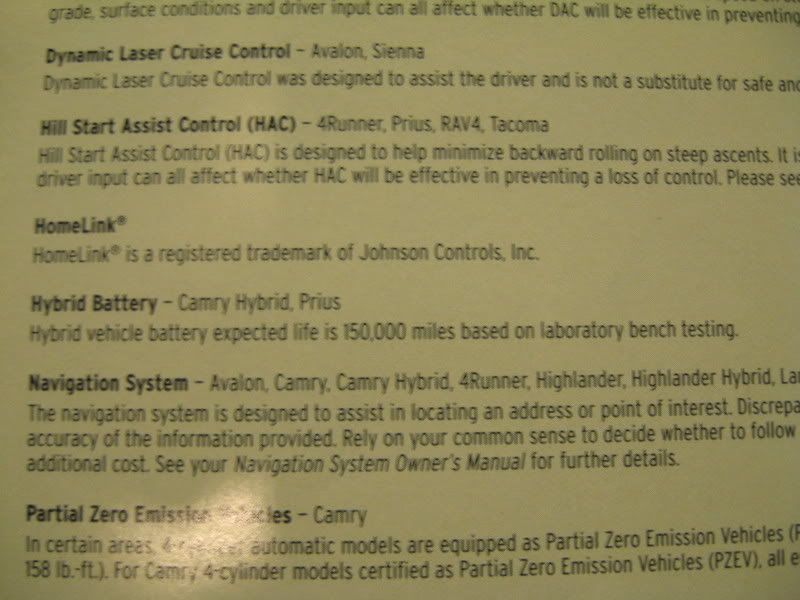Quote:
While waiting for my dinner to cook tonight, I opened up a brochure on the 2007 Toyota line-up and on the very last page, I noticed in small print that the expected battery life for the battery pack is 150,000 miles based on laboratory bench testing.
I had always thought that Toyota had refrained from making any specific statements regarding hybrid battery life, other than, the battery should last the life of the vehicle. While the Hybrid battery is warrantied for ten years or 150,000 miles in my state, it's still rather unwelcoming information to me if the battery pack is truly designed to only last 150,000 miles.
Now, I did a Google search and found the following info from the official Toyota website:
Quote:
Q: How long do the high-voltage batteries last?
GS: We designed them to last for the life of the vehicle. We're aware of owners who have racked up a quarter-million miles without replacing the batteries.
From:
http://www.toyota.com/html/hybridsynergyview/2006/fall/battery.html
So, why does that information contradict what I read tonight, from the Toyota brochure?
Comments?
Thanks.
Critic , I just reread everything on the link you provided .
My question to you is 'where is the contradiction' by Toyota ?
BTW , For those that are interested and can read , within the link there is a section covering a Toyota provided simple estimate of the cost of a simple battery replacement .
From the link ;
Q: How long do the high-voltage batteries last?
GS: We designed them to last for the life of the vehicle. We're aware of owners who have racked up a quarter-million miles without replacing the batteries.
( So this could be legitimately anywhere from 8/100 to 10/150 ) .
Q: What would it cost to replace a complete battery pack?
GS:
Less than $3000, plus labor.
Q: How long is the warranty?
GS: The high-voltage batteries are warranted for eight years or 100,000 miles, and under California regulations the battery warranty extends to 10 years or 150,000 miles.
-----------
If you search the Internet , the more recent total cost to replace the battery are being reported as between 3600.00/4700.00 . This varies in not only the usual ways (location , etc ) but also is sometimes effected by recommendations to replace other related components .
There is another group reporting in the 5000.00 - 6000.00 $ range , at least some of these seem to have been based on higher (older) battery and conponent prices .
Critic , in just general and informal laymans terms the useful economic life of a vehicle in the USA is pretty much bounded by roughly 8yr./100k thru 10-12yrs./150-160k .
Also relevant here is that in Japan the upper limit of a modified definition of useful economic life (current) is pretty close to 7-8yr/100k .
None of this ( in a limited sense ) is bad nor does it reflect poorly on hybrid batteries ; its just the way part of it it is for light duty automotive .
The hightest modern 'design durability factors' that you can even find an inkling of are in the the 10-12 yr.? range and 200,000 miles .
I haven't made a study of this by any means but so far , the only things I 've seen using these higher standards that even look remotely creditable concern GM ATs and GM brake hoses . Thats not a whole lot of stuff .
Yes , many things go way past that (including whole vehicles ) and no , we really haven't much real information in this regard in the public domain .
There is much more to this ; battery life is not controlled in the same way transmission and IC engine is .
TIME , battery charge/discharge cycles (qualities and quanities ) , temperature ( esp. heat ) effect battery life more rapidly and certainty , miles are basically completely meaningless - if you have all the other information .
This can appear to create some confusion and paradoxes when comparing a battery equiped hybrid to a conventional in terms of life expectencies .
Here is just a simple example of that .
Its easier for the current crop of hybrid batteries to pull 250 - 500,000 miles (assuming semi ideal duty cycle and user factors ) in say , 3-6 years than it will be to go thru 80,000 miles in 8-10-12 years , depending .
Now compare that thought to a 'conventional' powertrain in the same circumstances - its 'more likely' to be reversed .
A battery is just a different animal than an IC Engine .







